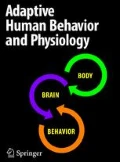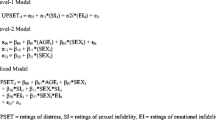Abstract
Objectives
Infidelity, actual or suspected, can trigger strong emotional reactions, such as jealousy, which could lead to the dissolution of the relationship. These reactions were predicted to vary with the severity of the infidelity, with the sex of the participant, with previous experience with unfaithful partners, and with the length of the relationship.
Method
We employed a sample of 447 Greek-speaking participants who were asked to indicate their reactions in different scenarios of infidelity.
Results
We found that more severe acts of infidelity were associated with higher emotional upset and jealousy and lower probability of forgiveness. Moreover, women indicated stronger emotional upset and jealousy than men, but they were more likely to forgive their partners. Furthermore, participants indicated more emotional upset and jealousy if they were in a long-term than in an early-stage relationship. Finally, participants who were older and who had experienced infidelity from their previous partners were more likely to forgive their partners’ infidelity than participants who were younger and who did not have such experience.
Conclusions
Our results indicated that several factors determined the severityof the reactions to infidelity.
Similar content being viewed by others
References
Allen, E. S., & Baucom, D. H. (2006). Dating, marital, and hypothetical extradyadic involvements: How do they compare? The Journal of Sex Research, 43, 307–317.
Apostolou, M. (2018). Why Greek-Cypriots cheat? The evolutionary origins of the Big-Five of infidelity. Evolutionary Behavioral Sciences. Advance Online Publication.
Apostolou, M., & Christoforou, C. (2018). Same-sex attraction and contact in an opposite sex partner: Exploring sex, religiosity, porn consumption and participation effects. Personality and Individual Differences, 131, 26–30.
Apostolou, M., Shialos, M., Khalil, M., & Paschali, M. (2017). The evolution of female same-sex attraction: The male choice hypothesis. Personality and Individual Differences, 116, 372–378.
Becker, D. V., Sagarin, B. J., Guadagno, R. E., Millevoi, A., & Nicastle, L. D. (2004). When the sexes need not differ: Emotional responses to the sexual and emotional aspects of infidelity. Personal Relationships, 11, 529–538.
Buss, D. M. (2000). The dangerous passion: Why jealousy is as necessary as love and sex. New York: The Free Press.
Buss, D. M. (2017). The evolution of desire: strategies of human mating (4th ed.). New York: Basic Books.
Buss, D. M. (2018). Sexual and emotional infidelity: Evolved gender differences in jealousy prove robust and replicable. Perspectives on Psychological Science, 13, 155–160.
Buss, D. M., Goetz, C., Duntley, J. D., Asao, K., & Conroy-Beam, D. (2017). The mate switching hypothesis. Personality and Individual Differences, 104, 143–149.
Buss, D. M., Larsen, R. J., Westen, D., & Semmelroth, J. (1992). Sex differences in jealousy: Evolution, physiology, and psychology. Psychological Science, 3, 251–255.
Buss, D. M., & Schmitt, D. P. (1993). Sexual strategies theory: An evolutionary perspective on human mating. Psychological Review, 100, 204–232.
Buss, D. M., Shackelford, T. K., Kirkpatrick, L. A., Choe, J. C., Lim, H. K., Hasegawa, M., et al. (1999). Jealousy and the nature of beliefs about infidelity: Tests of competing hypotheses about sex differences in the United States, Korea, and Japan. Personal Relationships, 6, 125–150.
Cobey, K. D., Buunk, A. P., Roberts, S. C., Klipping, C., Appels, N., Zimmerman, Y., Coelingh, H. J. T., Bennink, H. J. T., & Pollet, T. V. (2012). Reported jealousy differs as a function of menstrual cycle stage and contraceptive pill use: A within-subjects investigation. Evolution and Human Behavior, 33, 395–401.
Cobey, K. D., Pollet, T. V., Roberts, S. C., & Buunk, A. P. (2011). Hormonal birth control use and relationship jealousy: Evidence for estrogen dosage effects. Personality and Individual Differences, 50, 315–317.
DeSteno, D. A., & Salovey, P. (1996). Evolutionary origins of sex differences in jealousy? Questioning the “fitness” of the model. Psychological Science, 7, 367–375.
Edlund, J. E., & Sagarin, B. J. (2017). Sex differences in jealousy: A 25-year retrospective. Advances in Experimental Social Psychology, 55, 259–302.
Fisher, H. E. (1992). Anatomy of love: The natural history of monogamy, adultery, and divorce. New York: W. W. Norton.
Frayser, S. G. (1985). Varieties of sexual experience. New Heaven: HRAF Press.
Geary, D. C., DeSoto, M. C., Hoard, M. K., Sheldon, M. S., & Cooper, M. L. (2001). Estrogens and relationship jealousy. Human Nature, 12, 299–320.
Greiling, H., & Buss, D. M. (2000). Women’s sexual strategies: The hidden dimension of extra pair mating. Personality and Individual Differences, 28, 929–963.
Guadagno, R. E., & Sagarin, B. J. (2010). Sex differences in jealousy: An evolutionary perspective on online infidelity. Journal of Applied Social Psychology, 40, 2636–2655.
Gunderson, P. R., & Ferrari, J. R. (2008). Forgiveness of sexual cheating in romantic relationships: Effects of discovery method, frequency of offense, and presence of apology. North American Journal of Psychology, 10, 1–14.
IJzerman, H., Blanken, I., Brandt, M. J., Oerlemans, J. M., Van den Hoogenhof, M. M., Franken, S. J., & Oerlemans, M. W. (2014). Sex differences in distress from infidelity in early adulthood and in later life: A replication and meta-analysis of Shackelford et al. (2004). Social Psychology, 45, 202–208.
Harris, C. R. (2003). A review of sex differences in sexual jealousy, including self-report data, psychophysiological responses, interpersonal violence, and morbid jealousy. Personality and Social Psychology Review, 7, 102–128.
IFOP (2017). Les Françaises et l’infidélité feminine à l’heure des sites de rencontre. Retrieved from: https://www.ifop.com/wp-content/uploads/2018/03/3601-1-study_file.pdf
Laumann, E. O., Gagnon, J. H., Michael, R. T., & Michaels, S. (1994). The social organization of sexuality: Sexual practices in the United States. Chicago: University of Chicago Press.
Meskó, N. & Láng, A. (2013). Women evaluate their partners’ betrayal: emotional reactions, forgiveness, perceived threats of infidelity. In E. Farkas (ed) Acta Szekszardiensium/Scientific Publications, Tom XV. (pp. 47–59.) Szekszárd: Illyés Gyula Faculty, University of Pécs.
Shackelford, T. K., Buss, D. M., & Bennett, K. (2002). Forgiveness or breakup: Sex differences in responses to a partner’s infidelity. Cognition & Emotion, 16, 299–307.
Shackelford, T. K., Voracek, M., Schmitt, D. P., Buss, D. M., Weekes-Shackelford, V. A., & Michalski, R. L. (2004). Romantic jealousy in early adulthood and in later life. Human Nature, 15, 283–300.
Wade, T. J., & Fowler, K. (2006). Sex differences in responses to sexual and emotional infidelity: Considerations of rival attractiveness and financial status. Journal of Cultural and Evolutionary Psychology, 4, 37–50.
Welling, L. L., Puts, D. A., Roberts, S. C., Little, A. C., & Burriss, R. P. (2012). Hormonal contraceptive use and mate retention behavior in women and their male partners. Hormones and Behavior, 61, 114–120.
Author information
Authors and Affiliations
Corresponding author
Ethics declarations
Conflict of Interest
The authors declare that they have no conflict of interest.
Additional information
Publisher’s Note
Springer Nature remains neutral with regard to jurisdictional claims in published maps and institutional affiliations.
Rights and permissions
About this article
Cite this article
Apostolou, M., Aristidou, A. & Eraclide, C. Reactions to and Forgiveness of Infidelity: Exploring Severity, Length of Relationship, Sex, and Previous Experience Effects. Adaptive Human Behavior and Physiology 5, 317–330 (2019). https://doi.org/10.1007/s40750-019-00119-y
Received:
Revised:
Accepted:
Published:
Issue Date:
DOI: https://doi.org/10.1007/s40750-019-00119-y



